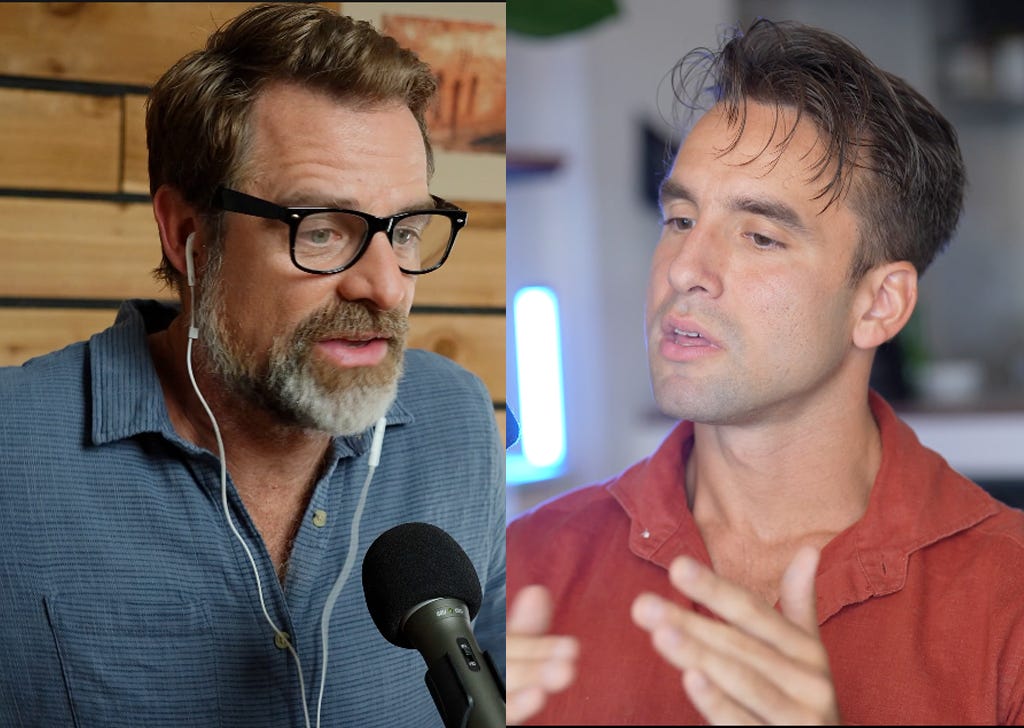Andrew Tate's Therapist on digging up our Childhoods (David Sutcliffe)
Do therapists influence how we interpret our past?
Back in September, I wrote an article titled Therapist argues Andrew Tate is a Hurt Child in response to therapist David Sutcliffe’s interview of Andrew Tate.
In my article, I broke down a couple sections of Andrew and David’s interview and pointed out that while it made for a very interesting podcast, if this were a standard therapy session, it would be concerning as it seemed like the therapist was encouraging Andrew to view his childhood as problematic.
David reached out to me and we ended up having a great discussion. Here is a 25 minute clip from the 2 hour discussion. (Scroll down after the paywall for the video. Click the voiceover button above if you’d like to just listen.)
David Sutcliffe:
If we've been abused by our parents in some way, physically, emotionally, if were betrayed, something happened to us, we have a right to be angry about it. The organism that we are will respond to oppression with rage. That's what it will do. Now, if you're a six year old and your mother or father is screaming at you all the time or hitting you, reacting with rage is going to make it worse. So you're going to suppress that rage, and you're going to develop some other strategy to avoid that behavior or avoid being subject to that behavior.
But that rage is inside you, and it's going to come out somehow, some way, probably in some future relationship, or you're playing sports and all of a sudden you're beating the shit out of somebody, something is going to happen, right? And we all know these parts of ourself where we're in traffic and we just lose our fucking mind. What is that?
I mean, my first time, I went to a week long group therapy retreat, I acted out killing my mother. Now, this sounds crazy, right? But I didn't know that level of rage was inside me. It wasn't a performance. I mean, I was an actor. I know what a fucking performance is. This came out of me. It completely shocked me, the intensity of the feeling that I had. And then it took me right to my pain, right to this place where I felt unseen, unloved by my mother. I then turned that into a story. “I'm unlovable, I'm not enough.”
And I then spent the rest of my life trying to figure out a way to win the love of my mother. So I became an actor and got famous, and that didn't work, and that started me on this journey.
Joseph:
A lot of it makes sense. All that right there. One thing I'm thinking of, though, is how often is therapist, let's say, kind of checking the patient on their interpretation? For example let's say someone says: “I sense I have a lot of hang ups or I feel like I have some sort of trauma because my brother was mean to me when I was a kid.” Would therapist jump straight into, like, “okay, what were the emotions you felt when he was being mean to you? What was the worst thing that he did? Tell me more about that.” Or are they going to, at some point in the process, say, “well, were you annoying kid? Like, was it possible that his meanness was appropriate to your provocation?”
If it was justyour brother saying, like, don't come in my room because you have sticky hands and you're going to get all my stuff dirty… so stay out of my room. But then maybe the kid at the time just interprets that as, “oh, he hates me, and why doesn't anybody like me?” You see what I mean? Are there certain times when the patient could just use some checking and it could be like, well, let's take a look. What did you do? What did he do? Okay, does [interpreting this differently] make you feel a little less oppressed?
Do you see what I'm trying to say?
Keep reading with a 7-day free trial
Subscribe to Joseph Everett’s WIL Newsletter to keep reading this post and get 7 days of free access to the full post archives.






